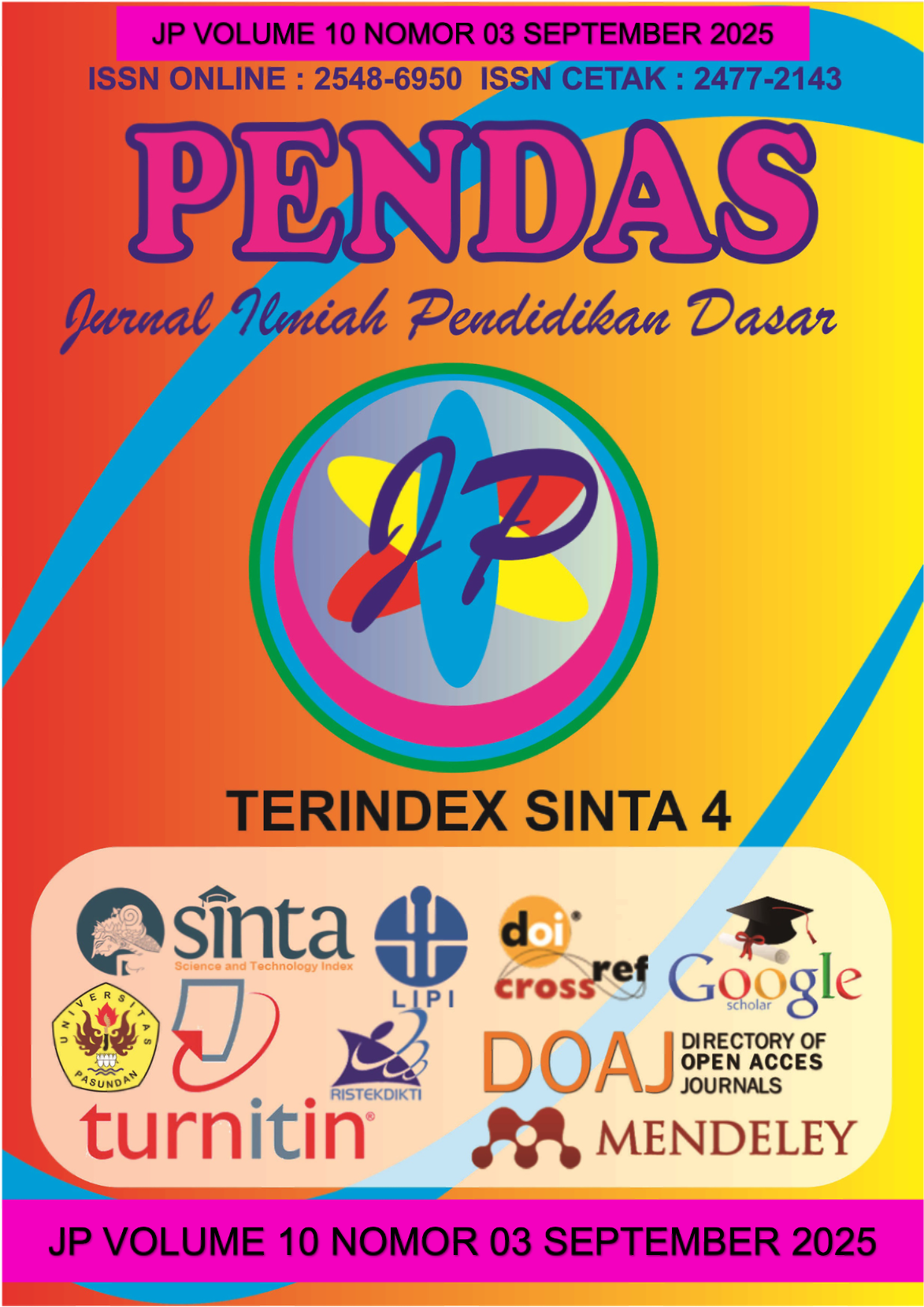PENINGKATAN HASIL PEMBELAJARAN IPAS MELALUI MODEL PROBLEM BASED LEARNING (PBL) BERBASIS MEDIA CANVA PADA SISWA KELAS IV SDN 03 KANIGORO.
DOI:
https://doi.org/10.23969/jp.v10i03.31493Keywords:
learning outcomes, Canva, problem-based learning, IpasAbstract
This study was conducted to improve the learning outcomes of students at SDN
03 Kanigoro on the material of social and cultural diversity in Indonesia through
the application of the problem based learning (PBL) model assisted by Canva
video media. This study is based on the low achievement of low student learning
outcomes with an average below the minimum completion criteria. This study aims
to determine the effect of the problem based learning (PBL) learning model
assisted by Canva video media. This study is a descriptive qualitative study. This
type of research is Classroom Action Research (CAR). The research location is at
SDN 03 Kanigoro with a sample of 24 students. The implementation of Classroom
Action Research (CAR) during the II cycle includes the planning, implementation,
observation, and reflection stages. The data obtained from this study used test
techniques in the form of written test questions, pre-test, post-test and non-test
techniques, namely observation, interviews and documentation, then analyzed
descriptively qualitatively. the results of the study showed that in cycle I the
average score was 73.9 in the category of not reaching the KKM. While in cycle II
obtained an average score of 90.2 in the high category. Thus, the indicators that
have been met with a significant increase in student learning outcomes in the
material on social and cultural diversity in Indonesia, the video-based learning
model assisted by Canva media is effective in improving student learning
outcomes in class.
Downloads
References
Arsyad, A. (2017). Media
pembelajaran (Revisi ke-7).
Jakarta: Rajawali Pers.
Azzahra, M., Mi'rojunisa, N., &
Hidayatullah, A. (2023).
Pengaruh model pembelajaran
terhadap hasil belajar siswa
sekolah dasar. Jurnal Inovasi
Pendidikan Dasar, 8(1),
55–63.
Febiani, M., Purwanto, W., &
Prasetyo, D. (2019).
Penerapan model
pembelajaran Problem Based
Learning untuk meningkatkan
hasil belajar siswa. Jurnal
Pendidikan Dasar Nusantara,
4(2), 89–96.
Hamalik, O. (2016). Proses belajar
mengajar. Jakarta: Bumi
Aksara.
Malmia, M., Wulandari, R., & Hidayat,
T. (2019). Implementasi model
pembelajaran berbasis
masalah dalam pembelajaran
sains di sekolah dasar. Jurnal
Ilmiah Pendidikan Guru
Sekolah Dasar, 4(3), 215–222.
Rahmadani, S. (2017). Peningkatan
aktivitas belajar matematika
melalui pendekatan Problem
Based Learning bagi siswa
kelas 4 SD. Jurnal PendidikanDasar Indonesia, 2(2),
245–252.
Rahmawati, E., & Atmojo, M. E.
(2021). Penggunaan media
Canva dalam meningkatkan
minat belajar siswa sekolah
dasar. Jurnal Teknologi
Pendidikan, 23(1), 34–42.
Rumiati. (2019). Strategi
pembelajaran berbasis
masalah untuk meningkatkan
keterlibatan siswa. Jurnal
Pendidikan dan Pembelajaran
Dasar, 5(1), 45–51.
Saputra, Y., Setiawan, R., & Lestari,
I. (2021). Penelitian tindakan
kelas sebagai upaya
profesional guru dalam
mengatasi permasalahan
pembelajaran. Jurnal
Penelitian Tindakan Kelas dan
Pengembangan Profesi Guru,
3(2), 89–97.
Subakti, H. (2020). Peranan media
dalam meningkatkan kualitas
pembelajaran di era digital.
Jurnal Pendidikan dan
Teknologi Informasi, 5(1),
20–29.
Sudjana, N. (2016). Penilaian hasil
proses belajar mengajar.
Bandung: Remaja
Rosdakarya.
Susanti, P. D. A. (2018).
Pembelajaran berbasismasalah dalam konteks
sekolah dasar. Jurnal Ilmu
Pendidikan, 6(2), 112–120.
Wulandari, L., Sari, D., & Yamin, M.
(2019). Aktivitas belajar siswa
dalam pembelajaran tematik
terpadu. Jurnal Pendidikan
Dasar Nusantara, 4(1), 75–84.
Downloads
Published
Issue
Section
License
Copyright (c) 2025 Pendas : Jurnal Ilmiah Pendidikan Dasar

This work is licensed under a Creative Commons Attribution 4.0 International License.



















